March 29, 1890
For eight time in nine years Lancashire is to-day represented in the final tie of the competition for the Football Association Challenge Cup, and for the fifth time the Blackburn Rovers are the champions of the county in the great struggle of the year.
Four years having elapsed since last they gained a like distinction, the team has almost entirely changed in its composition, and we, therefore, publish below brief notices of the players, accompanied by their portraits and those of a triplet of the best known supporters of the club.
We are indebted for the portraits of the team to Mr. R.P. Gregson, photographer, of Preston New-road, Blackburn, secretary to the Lancashire County, and a prominent member of the Football Association. Mr. Gregson has photographed each member of the team separately, and in a manner especially suited to the requirements of newspaper illustration.
Dr. MORLEY very properly forms one of the group of portraits, for the very simple reason that he accompanies the team everywhere, and is one of the most prominent and active members of the football world. He is chairman of the Rovers’ Committee, and senior vice-president of the Football Association. He has been instrumental in bringing about many much needed reforms, and it was principally through him that the Football Association decided to give competitors a share of the gate receipts in semi-final ties of the cup competition.
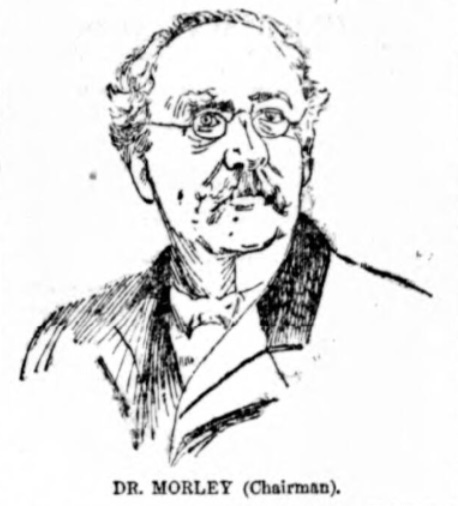
He has seen as much football as any man, and he is decidedly of opinions that the Rovers team, as at present constituted, is the best that ever represented the club. When reminded of the phenomenal success which the “Light Blues” met with in years gone by, the “Dr.” replied that the knowledge of the game had increased rapidly all over the kingdom, which made the disparity between the Rovers and other clubs less marked than it was formerly.
In Mr. JOHN LEWIS we have the founder of the club, and the most active member of the Executive, to whose labours, in the opinion of Dr. Morley, too little credit is given for the success the club has met with.

Mr. Lewis was a player himself in the history of the club, first as centre forward, and then as the partner of Jack Hargreaves as inside left wing forward. Subsequently he was the club’s secretary for about half a dozen years, and on his retirement was presented with a handsome timepiece.
He afterwards filled the office of treasurer. He is a well-known referee, and is renowned for the promptness and accuracy of his decisions.
Mr. T.B. MITCHELL, the genial secretary, hails from the Land o’ Cakes. He was born at Dumfries, and came to Blackburn 22 or 23 years ago. He has taken a keen interest in the doings of the Rovers ever since the club was formed, and for many years before he had any official connection with the team he regularly followed them all over the country.
It is about four years since he accepted the secretary-ship, and he and the committee have had a somewhat serious task to lift he club out of relapse which seems inevitably to follow even less success than the Rovers achieved in the football world. Fortunately, his position in life has enabled him to give his whole heart to the club, and Mr. Mitchell, Mr. Lewis, and Dr. Morley are largely responsible for the reputation which the Rovers enjoy of being one of the steadiest and best-managed teams in the country.
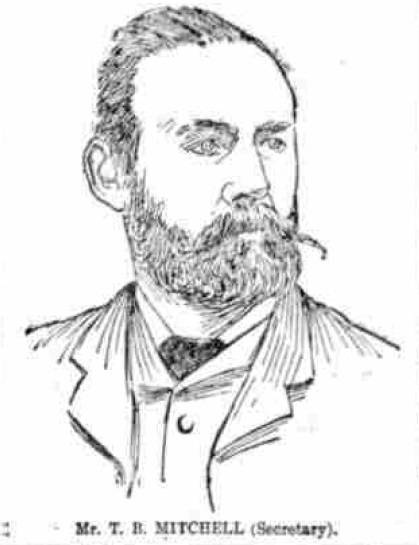
He was one of the prime movers in the establishment of the Football League, and as a referee he has officiated and is popular in all football centres of England, Ireland, Scotland, and Wales. He is fond of all kinds of sport. Up to a recent period, when he had an accident, he was first-rate shot, and as an owner of greyhounds he has met with more than average success at club meetings.
JOHN K. HORNE, the goalkeeper, is a chemist, 28 years of age. His height is 5ft. 10½in.; his height 11st. 8lbs., and he was borne at Accrington. While an apprentice he enjoyed football with the Accrington second team, and afterwards went to London, where be became connected with the Windsor Club.
Horne first figured as a goalkeeper with the Grimsby team, and afterwards took part in several six-a-side contests. Subsequently he identified himself with Bury, and while playing for this club was chosen to represent the Lancashire juniors against Northumberland at Bolton, which encounter he got through with a clean sheet.
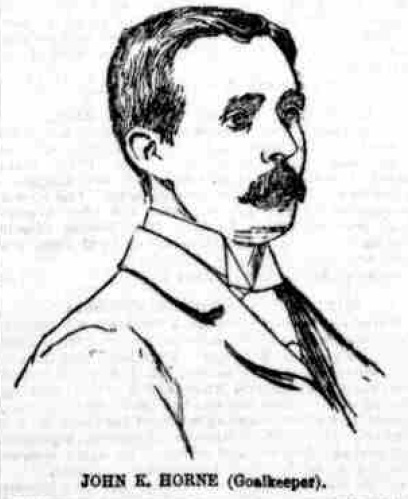
About this time Horne was induced to appear between the sticks for Accrington, a position which had been previously filled by his brother Dick – in his time a first-rate custodian – and he played for the Reds in that memorable Easter Monday encounter, when the North End were defeated after a run of uninterrupted success.
The following season Horne played with Burslem Port Vale for some time, but afterwards returned to Accrington, and remained with them almost continuously till the end of last season when, in consequence of his business engagements, he decided to retire from active “service.” This season, however, he has played with one or two junior clubs, and was eventually induced to help the Rovers out of their dilemma with regard to the position of custodian.
At one time Horne was regarded as one of the smartest goalkeepers in the country, and last season was on the reserve for International honours. He was twice chosen to play with his county, but on either occasion could be spared by his own club.
That he has not lost his skill is shown by the fact that he has only had 12 goals scored against him in the nine matches in which he has taken part this season, and six of the points were obtained by Queen’s Park last Saturday week, when the Rovers had a very weak team.
JAMES SOUTHWORTH, the right full back, is a native of Blackburn, and was born 25 years ago. His height is 5ft. 10½in., his weight 12 stone, and his occupation professional violinist and leader of the band at the Blackburn Theatre Royal.
He started his football career with the Blackburn Wednesday team, which used to play at Lammack, and of which he was captain. He then joined the Silver Star, of which Costley and several other old Olympians were members. He subsequently went to Chester and captained the Chester team for a while. He also played for that county.

He came back to Blackburn about six years ago, and played with his brother in the Olympic team. He then joined the Rovers, and played full-back with Beverely until he sustained a severe injury to his elbow. He afterwards played occasionally with the team, but his engagements at the theatre prevented him from doing so regularly. Last season he was chosen to play against Ireland, but was prevented from getting his cap by having to play for the Rovers in the English Cup tie against Aston Villa.
Southworth is one of the finest sprinters in the country, and his extraordinary turn of speed, his dash, and his strong kicking and skilful heading makes him a powerful opponent when he is in form, as he is just now.
On the cinder path his favourite distance is 120 yards, and though he has only been running two seasons he has won 20 prizes, three only of which are seconds, while he has only run three times without winning a prize. This remarkable record is all the more creditable when it is remembered that Southworth has always been scratch man. He is the holder of the Fielden Challenge Cup (open to all England), and seems likely to retain the trophy.
JOHNNY FORBES, left full back, is the skipper of the team. He was born at Alexandria, in Dumbartonshire, 26 years ago. He is 5ft. 8in. in height, and weighs 10st. 7lb. He joined a club called the Star at a very early age, and played full back. He left to play for the Vale of Leven second team, and after three matches he was selected to play with the first team against Queen’s Park. He distinguished himself so much on that occasion that he played regularly with them until he came to Blackburn last season.

He has played twice for Scotland against England, twice against Wales, and once against Ireland. On two occasions he should have played against England, but could not do so. Three times he has played in the final for the Scotch Cup, three times for the Glashow Charity Cup, and four times for his county.
He was captain of the Vale for three or four years, and has played as a forward, half-back, and full-back. He joined the Rovers last season, and has proved from the first a tower of strength to them. He is thin and wiry, and plays without leg guards. He is a first-rate tackler, a powerful kick, and always displays rare judgment. His experience has been of great use to the Rovers on several critical occasions since he joined the club. He is a very popular member of the team, and always plays a gentlemanly game. He played recently for Lancashire against Birmingham and District, and without doubt he is one of the finest players in his position in three kingdoms. He owns a good many medals.
JOHN BARTON, the right half-back, is a Blackburnian, and is 23 years of age. He stands 5ft. 7in., weighs 9st. 12lb, and is a coachbuilder by trade. He was originally a member of the Witton team, and has always played at half-back.
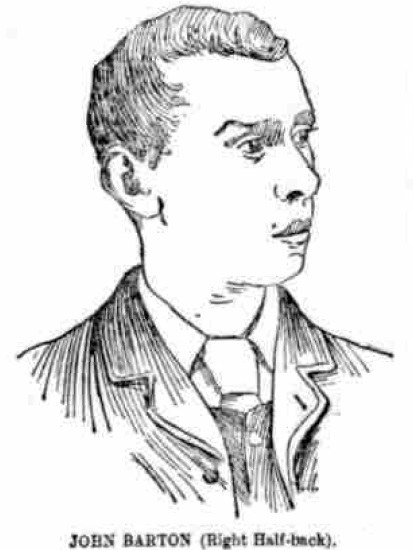
He joined the Rovers, but played with the second string until the beginning of this season, when he joined the first team. Although so young a player, he has already won both county and international honours, and seems destined for a distinguished career in the football field. He has a good deal of Forrest’s style, and is particularly good at tackling.
He holds a gold medal for assisting the Rovers to win the Charity Cup last season, and a gold medal for winning the cup in a six-a-side contest at Park Road as a member of the Rovers’ second team.
GEORGE DEWAR, the centre half-back, has played with the Rovers for one season only. He was born in Dumbarton, is 22 years of age, is 5ft. 8½in. in height, weighs 11st. 7lb., and an upholsterer by trade.
For three seasons, 1884-5 to 1886-7, he played with Dumbarton Athletic; for two years, 1887-8 and 1888-9, with the famous Dumbarton team; and joined the Rovers at the commencement of the present season.
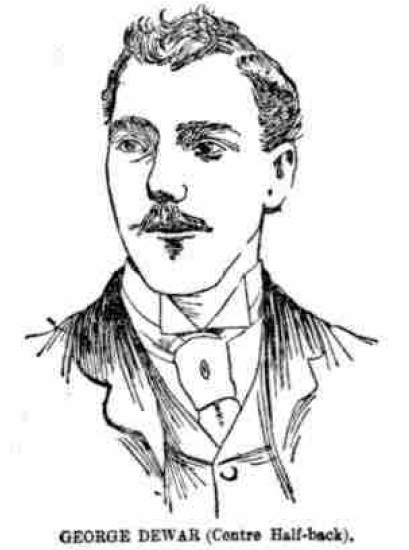
When in the Dumbarton team he played in a semi-final tie for the Scottish Cup against the Celtic, but the latter team proved victorious. The Dumbarton team, however, with Dewar in it, secured the Dumbartonshire Cup last spring. On two occasions Dewar has been included in Scotch international teams, once against Ireland in 1888, when he scored the first goal, and once against England in 1889, when the Scotchmen won by three goals to two.
Throughout his career Dewar has played centre half, with a few exceptions when he has been placed among the forwards on one wing or the other. Beside his international engagements, he has played for Dumbartonshire against Renfrewshire, and Liverpool and District. He also took part in a match at the Glasgow Exhibition, when a Glasgow team competed against a team selected from the Scotch counties.
He has not one of the most taking styles, but it is exceedingly effective, and in the opinion of many good judges he is the finest centre half-back in the country.
JAMES FORREST, the left half-back, is the only member of the team who has taken part in all the three matches in which the Rovers have won the Cup. Though a veteran in experience he is young in years, his age being 26. He weighs 10st. 4lb., and is 5ft. 7in. in height, was born in Blackburn, and follows his occupation as a tapesizer.
Originally he was a member of the King’s Own Club, and then for two seasons he captained the Witton eleven, being drafted into the Rovers in January, 1883. His reputation grew so rapidly, that in the following season he secured his international cap, and played against Wales, and the same season also found him representing Lancashire.

So greatly had Forrest proved his superiority in his own position as left half-back, that he played in all three Internationals in 1884-5. County engagements and North and South matches were incomplete without the presence of Forrest, and more than once he captained the team representing the North.
In all, Forrest has been selected to play in thirteen international matches, and has actually played in eleven. Four times he has played against Scotland, four times against Wales, and three times against Ireland. No other player in the North of England has been so often singled out for international honours.
In his own position, Forrest has no superiors, and few equals. His tackling is most determined, and the judgment with which he feeds his forwards is almost faultless.
JOSEPH MORRIS LOFTHOUSE, outside right wing forwards, is also a Blackburn man. He was born at Bank Top, and is 24 years of age, so that, though the term “veteran” may be applied with justice to him as a football player, it is a misnomer when used in reference to his age. His height is 5ft. 8in., and his weight 11 stone 12lb.
He captained the Grammar School Club at eleven years of age, and then joined the King’s Own, and captained it in its last season, when it was only beaten once.

He afterwards joined the Rovers, playing first with the second team. He was playing occasionally with the first when he was 16 years old, and represented Lancashire when he was 17. Since then he has never missed a season without playing for his country.
He has played for England seven times – twice against Scotland, twice against Wales, and three times against Ireland. In 1885 he represented his country in all three international matches.
He holds two gold medals for the English finals, five for the Lancashire Cup (three with the Rovers and two with Accrington, with whom he played for a couple of seasons), and two gold and two silver medals for the Charity Cup; one silver medal for Lancashire, and other trophies for running and swimming.
Lofthouse has generally played outside right, but for some time played centre and as outside left, and, gifted with a rare turn of speed and smart dribbling abilities, he is difficult to stop when he gets the ball. His dodging has frequently afforded considerable amusement to spectators.
HENRY CAMPBELL, the inside right wing forward, is another of the players who joined the team at the commencement of the season, and throughout he has played in partnership with Lofthouse. Thought not the least in weight, he is the least in height, measuring no more than 5ft. 6in. He is 22 years of age, weighs 10st. 10lbs., was born in Renton, and is by trade a dyer.
Campbell’s first experience with an organised team was with the Renton Athletic, for whom he played one season. He was then included in the reserve of the famous Renton club, and played on the left wing.

In the season of 1887-8 he was included in the Renton first team as inside right. Renton that season touching the high-water mark of its career. For two seasons he played with Renton, coming to Blackburn last August.
The first season Campbell joined Renton they won the Scottish Cup, and only suffered defeat once during the entire season; but in the following year they were thrown out of the Scottish Cup competition in the semi-final by the Third Lanark.
Renton held the Glasgow Charity Cup during both the seasons that Campbell was with them. Only once has Campbell played in an international match, and that was against Wales last year, while he has once donned the jersey for Dumbartonshire.
He holds three gold medals, one for the Scottish Cup final, and two for the Glasgow Charity Cup finals. With Campbell and Lofthouse the Rovers’ right wing is very strong. Lofthouse is the more showy player of the two, but Campbell is exceedingly useful and unselfish. He has dropped readily into the Rovers’ style of short and accurate passing.
JACK SOUTHWORTH for three season has been the Rovers’ centre forward, and his brilliant runs have placed him in the foremost rank of players. The only goal scored at Derby on the 8th inst. was secured by a bit of perhaps fortunate, but very clever play in finishing up a grand run from near midfield. Southworth is only 23 years of age, weighs 11st., is 5ft. 9in. in height, was born in Blackburn, and is a professional musician.
His first efforts at club football were with the Brookhouse Rangers, and then he passed into the second team of the Blackburn Olympic. In a very short time his ability was recognised, and he was included in the first team of the Olympic, playing in goal when he was not included in the forward division.
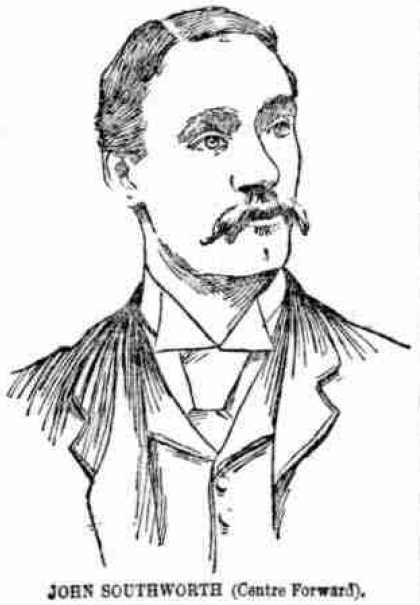
Then came a break in his football career so far as Blackburn is concerned, and removing to Chester, he was asked to join the principal team in that city. Returning at Christmas 1886, he joined the Olympians again, and was in the team when the Rovers defeated them in the final for the Lancashire Cup in 1887. At the beginning of the following season his services were requisitioned by the Rovers, and since then he has always occupied the position of centre-forward.
Southworth is an international, and has also played for Lancashire, and holds one gold and two silver medals. He captained the Rovers last season, and if he could only make up his mind to part more readily with the ball, he would be unsurpassed as a centre forward by any man in England.
NATHANIEL WALTON, inside left wing forward, is a Prestonian. He is 22, weighs 10 stone 12lb, stands 5ft. 8in., and follows the occupation of a coachbuilder.
The first club he played with was the Imperial, and he afterwards joined the Rovers. The first important encounter in which he took part was against the Olympians in an Association Cup tie. He played “on and off” with the first team until the Rovers met West Bromwich Albion in the final tie of the Association Cup Competition at Derby. He had not played with them at the drawn game at the Oval, but he did in the match at Derby, when they won.
“Nat” is one of the most sterling players going. He is a thoroughly reliable man at every point of the game. He is always good, though perhaps rarely brilliant, and it is strange that both his county and country should have neglected him so long.
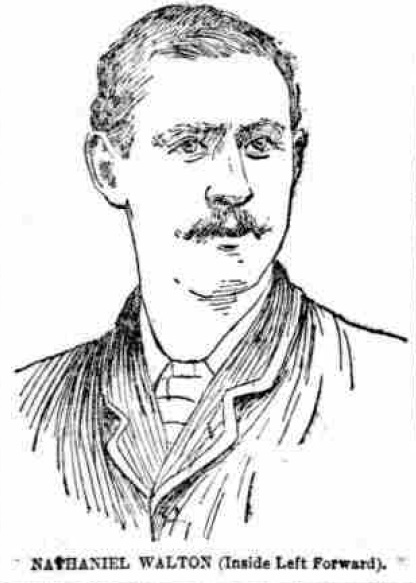
He was chosen for the first time to play for Lancashire when they met Birmingham this season. He played against East Scotland last Saturday, and a fortnight ago he took part in his first international against Ireland, and he played in the trial match for Scotland last Monday.
Walton can play on either wing equally well. He is an admirable partner for Townley, to whom he passes most unselfishly, and gives the “wriggler” as much work to do as he can possibly manage.
BILLY TOWNLEY is the only satisfactory successor to Jack Hargreaves the Rovers have ever had on the extreme left. He is noted for his speed, capital runs on the touch line, dodging, judicious centring, and for keeping well up towards his opponents’ goal.
Townley is one of the tallest members of the team, and is one of the most lightly built, as although 5ft. 10in. in height he only weighs 10st. 6lb. He is a Blackburnian, 24 years of age, and follows the profession of a schoolmaster.
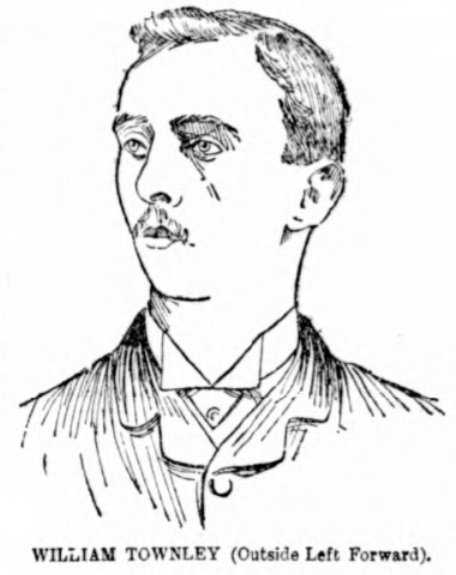
Football has always had an attraction for him, and after leaving school he was for 12 months a member of the Blackburn Swifts Club. Thence he went to the Blackburn Olympic team as centre forward. The Rovers’ Committee, looking out for local players to strengthen their team saw in Townley the making of a first-class player, and they offered him a position in the team, which he accepted, and for eight or nine matches played as centre forward.
He was then placed on the left wing, first on the inside and then on the outside, and had for his partners at different times Sowerbutts, Chadwick, Herbert Lincoln Fecitt. Like most of the Rovers’ team Townley has been selected for International honours, and played against Wales last season and against Ireland this season. He should have played on Monday in the England v Scotland trial match, but could not get away.
Townley holds two medals, one gold and the other silver, secured by playing in Charity Cup final ties.
(Lancashire Evening Post, 29-03-1890)
